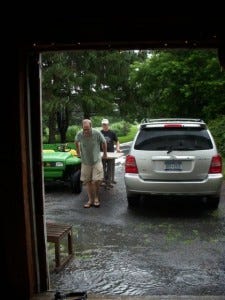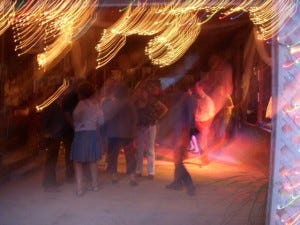Gotta Dance
Here in the Hudson Valley, we are having the sort of deluge that will only be amusing—and even then, only slightly—après. That it should be the first year of the huge, Four-Family Garden is inconvenient, if not heartbreaking. The other day, C took 14 slugs off of one cilantro plant. Long ago, I gave up attempting to find cheer in the words “Well, at least I don’t have to water.” The tomatoes have outgrown their cages already and, yes, there are many blossoms, but fruit set is scanty. You need sun for that. In spite of the rain, we now turn our attention to the social whirl that results when an entire society emerges from five months of self-enforced lock-down. Since I choose not to be here during the winter (instead ranging the roads of more temperate locales), I can’t be sure how this plays out, but every spring I see people who have been here the whole time greet one another like long-lost friends. The pent-up entertaining imperative is frightening, and people squabble over Saturdays in July with the same cattiness of a sixth grade girls locker-room. Parties, benefits, and dinners are packed into the limited season like sardines. It was, thus, that the last week saw two social events of diametrically opposing style: one was my own idea, the other was that of a complete stranger. I cooked for them both.
Part 1. Gotta Dance Sometimes, you just have to.
When the world is throwing multiple obstacles across the road you'd planned to travel, everyone you know has ratcheted down their career expectations by a couple of notches, and the idea of replacing a broken soufflé dish fills you with fear and loathing instead of the usual acquisitive bliss: You've gotta dance.
When the King of Pop dies, and suddenly we realize it's ok to forgive him and concentrate on his talent instead of his twisted life: You've gotta dance.
Even though our culture evidently sees the arts as "optional," and so we must all raise money any which way we can, to support them, sometimes the burden of paying $100 to attend a party with dancing starts to feel like too much. Because sometimes, we need a party in aid of nothing but us. Selfish? Maybe. Perhaps it was simply the need to return to a simpler time, an era when a keg, a gallon of Inglenook, and a decent stereo could spell a magical evening—when the problems of the world seemed like—Hell, they were—someone else's.
Last Saturday, a group of people in Greene county pooled their not-inconsiderable natural resources to create a party about nothing but dancing. I christened it the Populist Barn Dance. There were no speeches, no brochures, no silent auction, and no holds barred. Jared donated his big old barn, and a team of ex-musketeers set about turning it into a magical fairyland. On the top floor, they discovered acres of white tulle, a gaggle of grass skirts, yards of glittery silver tassles, and posters from five decades of Broadway shows. There were countless strands of fairy lights, old chandeliers and less fashionable light fixtures; many of them still worked. Cords were strung, garlands were lit; outside, torches were filled with lamp oil. A cheerful Bob ranged the old wooden boards with a Shop-vac. His wife Virginia scoured the bathroom in the pool house of spider webs and dead moths. Old furniture was brushed off and arranged into a seating area, complete with a table lamp patched into the spider-web of extension cords that brought the barn to life. By the time they were done, I would happily have moved in to a place that had been home only to bees, birds, and rodents throughout its century of existence.
Yves and Amy, friends and recent transplants from New York—and principals of the band Nite-Time—amazingly had no paying event scheduled for the last Saturday in June. They volunteered their iPod and a sound system big enough to fill a basketball court. I vowed to bring in some finger food at rock bottom costs. One hundred people were invited; we anticipated, perhaps, sixty. It was going to happen for very, very little money, but In This Economy none of us felt comfortable footing the whole bill for food and drinks. There was some discussion of making the party pot-luck, but my catering background, and the potential for an untidy plethora of small and mysterious foil-covered dishes nudged us in the direction of a collection basket. We put out a big jar and suggested $7 a head, just to cover our out-of-pocket costs. It was truly to be a People’s Party.
The musical talent arrived with a special surprise: two huge stands of colored disco lights that would flicker in time with the back beat. I made 300 crostini bases, ie slices of baguette bathed with olive oil, seasoned with salt, pepper, and Greek oregano, and toasted. To spread upon them: Green Pea Pesto, redolent with parmesan, rich with ricotta, studded with roasted prosciutto; Smoked Trout Mousse, the luxe here contributed by cream cheese, the bright notes by orange zest and chives from the garden; and Tomato-Mozzarella-Basil, your basic bruschetta topping with plenty of garlic. I brought the cost in at $1.50/head. The remaining budget was sucked up by many boxes of jolly nice wine, a keg of beer, a veritable ocean of still and sparkling water, and oil for the many torches that now lined the long, gravel driveway to Jared’s barn.
At the hour appointed for the party, the skies cleared as if on cue. The acres of lawn glowed a luminous green, and shafts of setting sun flirted around the multitudes as they trickled in. Greene county is home to people of every possible age, sexual orientation, and background, and all of them were represented at the Populist Barn Dance: those who were born here, those who came “up the country” ten or fifteen years ago, and many who chose to leave the big city after 9/11, or even more recently. It is an organic community, an anti-Hamptons, a place where metal siding and overhead wires recede from your awareness because they are less important than the landscape beyond, and within.
Our dee-jays, for once able to dance to the music instead of play it, seemed to enter into a symbiotic relationship with the pulsating crowd, intuiting just before we did exactly the zetgeist that should come up next. Inside, people who were not dancing sipped, snacked, and watched the dancers. Outside, sheltering pines provided intimate meeting places away from the music. The turquoise water of the swimming pool glittered, but remained still, undisturbed beneath our cool, wet early summer air. As the hour grew later, the children disappeared. Now the dancers were serious, sweat-slicked, moving in a blood-deep syncopation that erased years, sometimes decades. The music flowed on from the sixties, seventies, eighties, and the exultant Michael Jackson tributes into funk, electronica, deep inside the sinews where the urge to move to rhythm lives until we let it out. Yves and Amy’s faces were intent, focussed, eerily lit by their two laptops, as they scrolled and mixed on the fly. I could have danced all night, but in the absence of urban noise, sound will carry far across the fields, and country neighbors are less ephemeral than the city variety. As the evening had to do, it moved inexorably toward an end, I stood outside for a few minutes to catch my breath, and savor the success of an idea born of a desire to turn back time. Inside, framed by the huge open barn doors, an impromptu ballet was playing out to Bonnie Tyler’s Total Eclipse of the Heart. It was demonically choreographed by a tall, goateed man, lit by the flickering disco lights, and heart-breaking in its apropos symbolism. Again and again, a fairy-like sprite leapt impossibly high around the doomed lovers, one of whom sported a gingham dress, cowboy boots, and a riding crop.

The post-urban event symbolized everything we, and seemingly, others, are seeking here, so far from what was once known as civilization: A simpler life, but one with all the sensual magic, raucous humor, and streetwise savvy of Broadway, Christopher Street, or Venice Beach. Here in Greene, the luscious stage is set and the eclectic characters are met.
Next week: The tale of the Petit Dinner of the Bourgeoisie, featuring the re-purposing of the Populist crostini bases.







